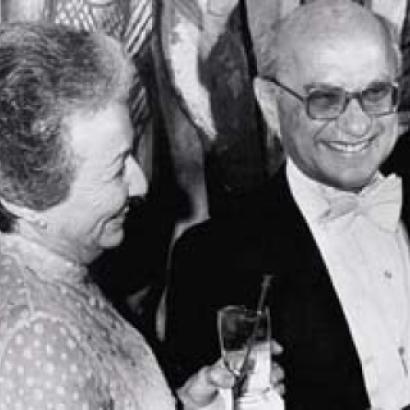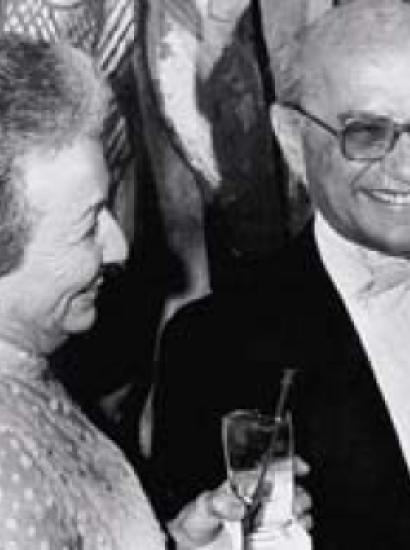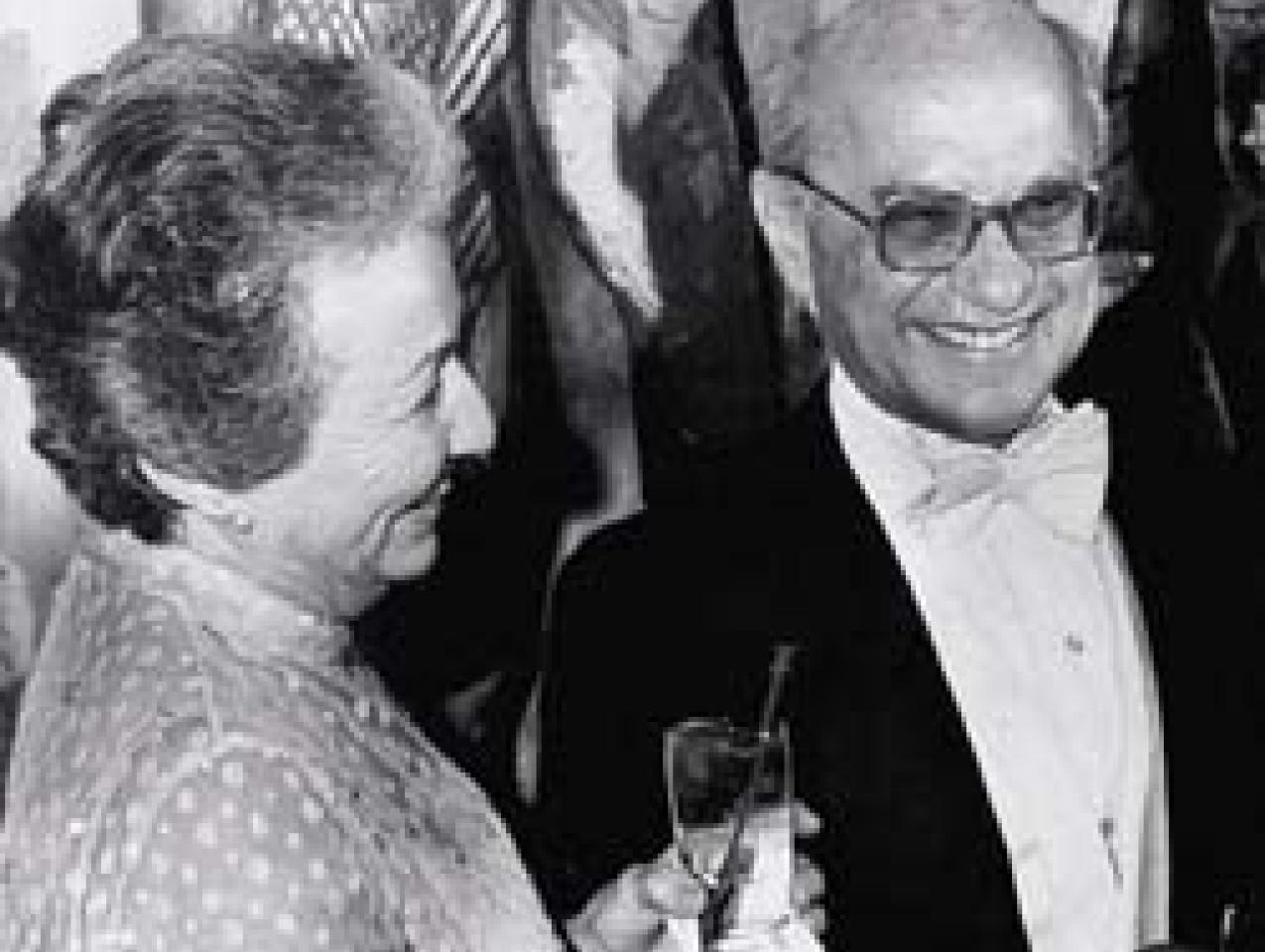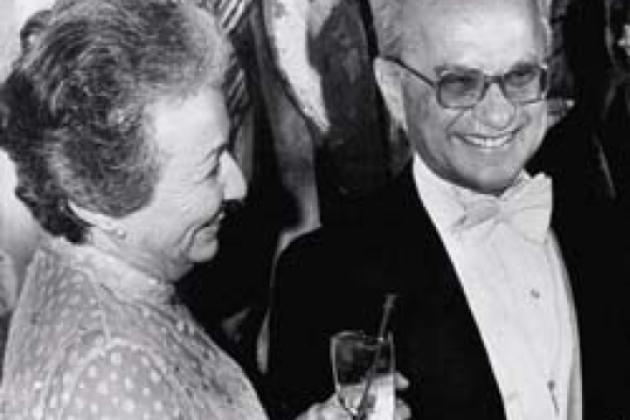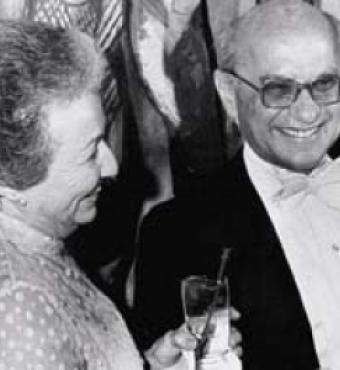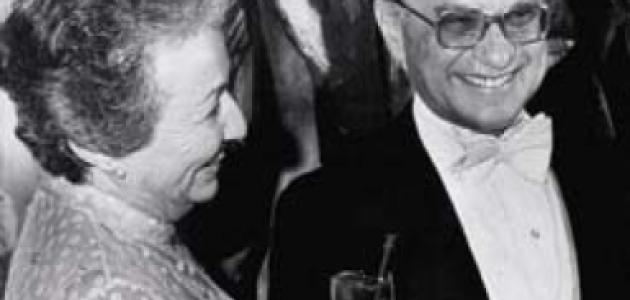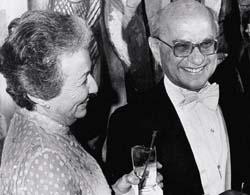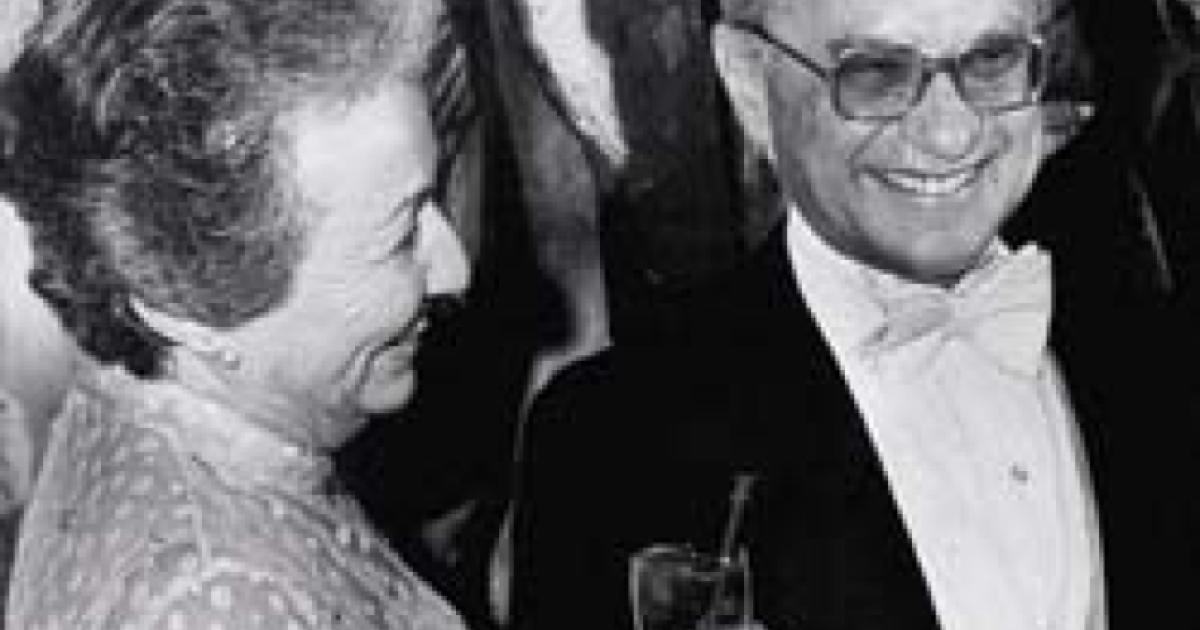- Economics
- World
- History
THE PRELIMINARIES
MILTON: Nineteen seventy-six was an extraordinary year for the United States and for the University of Chicago. All seven recipients of the Nobel Prize were Americans (seven because the medicine prize and the physics prize were each divided between two people). Two recipients, Saul Bellow for literature and I for economics, were from the University of Chicago.
I hadn’t quite realized until we were in Stockholm how much the Nobel Prizes mean to Sweden. Wrap together the World Series in baseball, the Super Bowl in football, and the presidential election, and you have a rough idea of what the Nobel Prizes mean there. The award ceremony is the great event of the year. I remarked to someone in Stockholm, “I understand that the Nobel Prizes and the spring breaking up of the ice are the two great events in Sweden.” With utter seriousness, he said, “Oh, the breaking up of the ice doesn’t hold a candle to the Nobel Prizes!”
ROSE: We arrived in Stockholm on Monday, December 6, one day before the calendar of events began in order to give ourselves twenty-four hours to recover from jet lag. Our arrival at Stockholm airport was, I suspect, a new experience for the Nobel Committee and for Stockholm—and most certainly for us. We expected to be met at the airport by a representative from the committee. We did not expect the number of people who were in the reception room to welcome us or the tight security that surrounded us from the moment we arrived until we departed from the same airport.
After a most friendly welcome, we were told that no representatives from the press had been permitted at the airport because of the fear of demonstrations.* Also, we were to have twenty-four-hour-a-day police protection for the entire time that we were in Stockholm. There had been demonstrations and newspaper attacks, sponsored by an organization called the Chilean Committee, against Professor Erik Lundberg, chairman of the Nobel Economics Committee, and the Nobel Committee protesting the award of the economics prize to Milton. As we left the airport for the trip to the Grand Hotel where all the laureates were housed, the official car assigned to us for the week was preceded and followed by police cars. From that moment until we left, we were never without our two bodyguards. In addition, our room was under surveillance day and night by other police. Not even a maid, we discovered, was permitted to enter our room without a police escort!
A press conference had originally been scheduled for the afternoon of our arrival, but Milton asked that it be postponed to the next afternoon, which it was. This was probably the largest press conference that any laureate had ever had—with the exception of Solzhenitsyn—but not because reporters and others from the media had a burning desire to hear Milton’s views on economic matters or anything related to his receiving the prize. Questions about economics were conspicuous by their absence. All interest and all questions centered on Milton’s alleged participation as an adviser to the Chilean junta. With a few exceptions, the questions were not particularly hostile. I was impressed by how hard it is to disabuse people of notions that they have formed on the basis of erroneous information. In anticipation, Professor Arnold Harberger, who had arranged Milton’s one six-day trip to Chile, had written a detailed letter to Baron Stig Ramel, president of the Nobel Foundation, setting forth the facts about his and Milton’s involvement with Chile. This letter was given wide circulation, yet it did not prevent continuing attacks on Milton based on wholly false information.
At the press conference, all interest and questions centered around Milton’s alleged participation as an adviser to the Chilean junta. I was impressed by how hard it is to disabuse people of notions they have formed on the basis of erroneous information.
Though the journalists in the room were not hostile, we were told that a crowd of demonstrators, both in the lobby of the Swedish Academy and on the street, were very agitated. After the conference, our car was hemmed in by demonstrators or other cars (we never found out which), so we were taken by a side door to a side street where a police car was waiting. Even with all this precaution, there were still a few demonstrators in our path who managed to get a couple of pictures—nothing more.
Professor Carl Bernhard, secretary of the Swedish Academy of Sciences, hosted the first official affair of the Nobel week, a reception and dinner at the academy. Most of the people who came through the receiving line on this occasion were new to us, as were the other laureates and their wives—except for Saul Bellow and his wife whom we knew from Chicago.
At the dinner after the reception, when we were seated at small tables for about ten people, we began to recognize names and faces. By the end of the week, the faces became very familiar and we were often even able to match names and faces! At the close of the dinner, Professor Bernhard used the occasion to explain in some detail how the Nobel laureates are selected. I don’t know whether the secretary of the Nobel Committee makes this explanation every year or whether Professor Bernhard made it this year because of the reports of controversy about the prize in economics.
THE AWARDS CEREMONY
ROSE: Among the most impressive and memorable events of the week were the ceremony itself and the banquet at the City Hall immediately after the ceremony. However, the continuing sequence of TV interviews, press conferences, receptions, dinners, and the like kept us quite busy for the eight days we were in Stockholm.
We were told before we left our hotel for the awards ceremony that there was to be a demonstration outside the Concert Hall by the same group that had been demonstrating before we arrived in Stockholm. There was much activity among our police guard, but we were never aware of any demonstration. I do not know whether that was because we entered the hall through a door unknown to the demonstrators or whether we were so well surrounded by plainclothes police that we did not see the demonstrators. The police around us were always in plain clothes, never in uniform.
Soon after we entered the Concert Hall, Milton left to join the other laureates; I went with our guests to the seats reserved for us. While the hall was filling, the orchestra played a selection of tunes from West Side Story, familiar to all Americans. The hall quickly filled so that by 4:50, the appointed time, all seats seemed to be occupied. A blare of trumpets at exactly five o’clock, and King Carl followed by Queen Sylvia, with Prince Bertil and his wife, Princess Lillian, came out to the platform from a door at the left to the music of the “King’s Song” played by the Stockholm Philharmonic Orchestra. From a door on the right side of the platform, the laureates, each escorted by a representative of the Nobel Committee, then entered. Their arrival, in the order specified by Alfred Nobel, was also heralded by a blare of trumpets. The laureates took their places on the right side of the platform, their escorts on the left. Already seated on the platform before the arrival of the king and his party were the laureates of previous years, who sat behind the laureates of the current year, and members of the Nobel Foundation, who sat at the center rear. The entire audience stood from the time that the trumpets heralded the arrival of the king until the laureates were seated. Music was played between all events on the program.
The actual presentation began after a welcoming oration in Swedish by Professor Sune Bergstrom, chairman of the Nobel Foundation. The representative from the Nobel Physics Committee rose and gave a fairly lengthy speech in Swedish justifying the award to the physics laureate or, as in this case, two laureates. At the conclusion of the speech, the escort addressed the laureate in the latter’s language. (This year, since all laureates were American, English was the only other language used.) This speech was short and ended with an invitation to the laureate to receive the Nobel gold medal, the diploma, and a draft for the monetary prize, from the hand of His Majesty. At this point, according to custom, there is a blare of trumpets and the laureate from his side and the king from his walk to center stage, the laureate receives the medal and certificates from the king, shakes hands, some words which no one remembers pass between the king and the laureate, and the king returns to his place while the laureate faces the audience, bowing to the applause.
Each laureate was presented in this fashion, chemistry following physics, then medicine and literature. Up to this point, the ceremony proceeded in its time-honored pattern. But then the pattern changed. Professor Lundberg gave his speech in Swedish justifying the economics award. Milton rose from his seat as Professor Lundberg gave the short speech in English ending with the usual invitation to receive the award from the king. At this point, a figure in tails stood up in the far rear of the balcony, hands outstretched, shouting in English “Down with capitalism, freedom for Chile!” The moment was short but very tense. Ushers or police, I don’t know which, quickly removed the demonstrator from the hall. Professor Lundberg in a low voice apologized to Milton for the interruption, ending with “It might have been worse.” Since demonstrators were not a new phenomenon for Milton and me, we felt that it might indeed have been worse. Milton and the king proceeded to center stage and after receiving his medal and certificates and shaking the king’s hand, Milton stood for a longer ovation than had been received by any of the preceding six laureates.
The audience, overwhelmingly Swedish, was clearly not in sympathy with the demonstrator. Wherever we went during the next few days, we were met with apologies for the occurrence.
MILTON: As so often happens, such a demonstration tends to backfire. The immediate result of this one was partly that the young man was grabbed by the marshals and pulled out of the room. In addition, I ended up with twice as long an ovation as anybody else.
THE NOBEL BANQUET
ROSE: We were told that a large demonstration was being staged outside the Concert Hall. Newspapers reported anywhere from two to six thousand people marching up and down with banners protesting Milton’s involvement with Chile. Our attendants protected us by using a somewhat roundabout route to take us from the Concert Hall to the City Hall. As a result, we saw the demonstration only in the distance from the windows of our car. The mass demonstration inconvenienced many of the guests much more seriously, both when they initially entered the Concert Hall and later when they made their way on foot from the Concert Hall to the City Hall. The experience did nothing to increase their sympathy for the demonstrators.
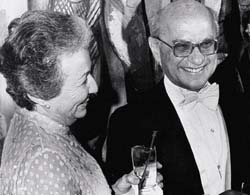
Upon arriving at the City Hall, we were ushered into a large room called the Prince’s Gallery for a ceremony at which the foreign minister of the relevant country presents the laureates and their wives to the royal family. This year, Ambassador Smith was the only foreign minister in attendance. The laureates and their wives took their places along one side of the gallery. The king, followed by the queen and other members of the royal family, entered the gallery and moved at a leisurely pace along the receiving line, the ambassador making the introductions. Conversations were brief, informal, and friendly.
We then proceeded to the Gold Room, where the banquet is always held. The main events during the banquet were toasts, first to the king by the president of the Nobel Foundation and then by the king to Alfred Nobel. At the end of the dinner, a representative of the Nobel Foundation gave a brief talk in English to the laureates and invited the laureates one by one to answer. Each laureate then delivered a brief talk that he had prepared in advance. In his talk, Milton discussed his reaction to all of the attention the announcement of the Nobel award had created.
Delighted as I am with the award, I must confess that the past eight weeks have impressed on me that not only is there no free lunch, there is no free prize. It is a tribute to the worldwide repute of the Nobel awards that the announcement of an award converts its recipient into an instant expert on all and sundry, and unleashes hordes of ravenous newsmen and photographers from journals and TV stations around the world. I myself have been asked my opinion on everything from a cure for the common cold to the market value of a letter signed by John F. Kennedy. Needless to say the attention is flattering, but also corrupting. Somehow we badly need an antidote for both the inflated attention granted a Nobel laureate in areas outside his competence and the inflated ego each of us is in danger of acquiring. My own field suggests one obvious antidote: competition through the establishment of many more awards. But a product that has been so successful is not easy to displace. Hence, I suspect that our inflated egos are safe for a good long time to come.I am deeply grateful to you not only for the honor you have conferred on me, but equally for your unfailing Swedish hospitality and friendship.
The banquet came to a close with a most impressive performance by students of Stockholm. Singing was first heard before the students actually appeared. Then we saw them entering the balcony above the banquet hall. The singing stopped and one student stepped forward, removed his cap and addressed the laureates in perfect English. The student selected to greet the laureates this year was Lars Wijkman, and his talk was a delight for us to hear.
MILTON: Wijkman presented an extremely effective statement of his belief in freedom, of the danger to freedom that arose from government controls and the expansion of government, and of the importance of maintaining a free society that would enable individuals to pursue their own objectives. Well worded, well said, and in English, the talk gave us hope that such sentiments were developing among the younger people in Sweden. Wijkman’s ringing call for a free society was a welcome contrast to the parrotlike conformity of the demonstrators.
ROSE: The departure of the students, singing as they went, concluded the banquet, but not the evening’s celebrations. We made our way, following the students, to the so-called Blue Room. Here the students were already dancing. We too did our share of dancing, but found it more interesting to talk with groups of students gathered around. Before the evening was over, Milton was presented with a student cap by one of the students and the next day received a Stockholm University tie to go along with it. Whether these gestures on the part of the students were their way of apologizing for the one among them who performed so disrespectfully at the presentation of the awards or whether they were just a result of the usual affinity that Milton has with students of all lands, and vice versa, I cannot say, but we were touched.
THE NOBEL LECTURE
ROSE: On the last day, after a pleasant lunch at the Stockholm School of Economics, Milton gave his Nobel lecture. There was a good deal of apprehension beforehand about the possibility of another demonstration. Although our bodyguards and other security men were constantly around us, I must confess that for the first time I myself felt some apprehension. Universities are not adapted to tight security and, at least in recent years, have been a popular place for demonstrations of all kinds. We were all relieved when our fears proved unfounded. For the most part, only economists attended the lecture, which was expected to be, and was, technical in nature. The room was full, but all who came were there because they wanted to hear what Milton had to say.
MILTON: The establishment of a Nobel Prize in economics has frequently been criticized on the ground that economics is not a scientific discipline like physics or chemistry or medicine, but rather a part of philosophy or politics or current affairs, so enmeshed with values that objective judgment of scientific work is impossible. I do not myself believe that there is an iota of difference in these respects between economics and other disciplines. Politics enters into the other disciplines at least as much as it does in economics.
I wrote my lecture primarily to make the point that economics was or could be a positive science like physics and chemistry. Instead of discussing the methodological issue explicitly, I tried to illustrate it by example. The example I chose was the change in professional views on the relation between inflation and unemployment. Those views had changed drastically over the previous thirty years. And they changed, not because of any change in values, not because of any political considerations, but because the facts made it impossible to continue to hold certain hypotheses that had originally been accepted. Although that was intended to be the main thrust of the talk, most of the newspaper commentary left that out and went to something else.
That was our final day in Stockholm. We left that night. It was a great week, and Rose and I were reminded of an old TV program entitled That Was the Week That Was.
Editor’s note: After he made a brief trip to Chile in 1975 as the guest of a private organization, Milton Friedman was erroneously tarred as an adviser to the authoritarian regime of Augusto Pinochet. As a result of this controversy, protesters appeared when the Friedmans traveled to Stockholm to receive the Nobel award.
Friedman attempted to correct his critics in a 1976 letter: “I am not now, and never have been, an economic adviser to the Pinochet Chilean junta. I spent six days at the end of March 1975 in Chile under the auspices of a private Chilean bank. I gave public lectures and seminars on inflation, talked to many citizens from different walks of life and met with many government officials, including General Pinochet. That was my first and only visit to Chile, and my only contact with Chilean government officials.”








